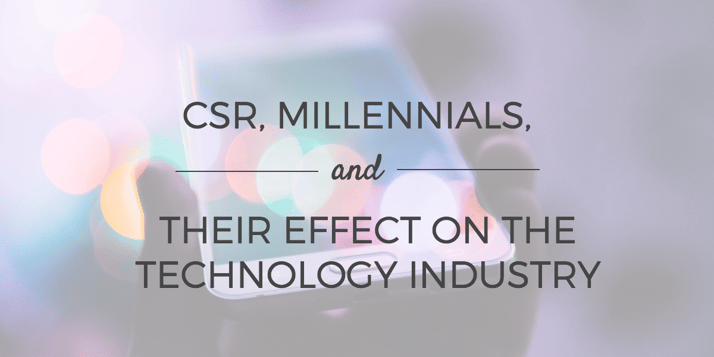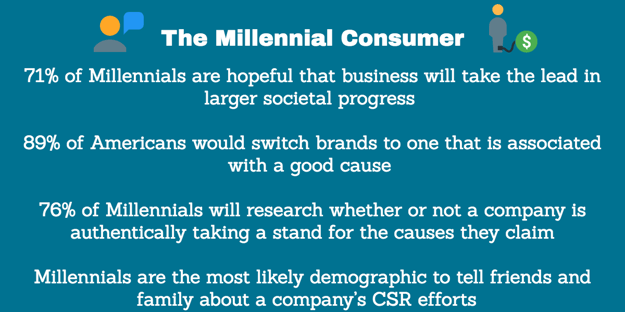
In the last decade, Corporate Social Responsibility (CSR) has taken an increasingly important role in staffing, advertising and partnership efforts across all industries. As the number of Millennial employees, consumers and decision-makers grows, tech companies are changing the way they hire, communicate and work with this new wave of professionals. For business owners to thrive in the coming years, it’s important to develop an understanding of this generation’s habits and thought processes in order to adapt to the industry’s changing landscape.
Attracting the Millennial Workforce
Recent studies have shown that holding onto Millennial employees is no easy task. The Harvard Business Review reports that 71% of Millennials are either not engaged or actively disengaged at work, and 21% of Millennial workers had left their job in the last year to do something else. These findings beg the question: what can companies do to attract and retain employees?
A recent study by Gallup found that Millennials value learning and development above all else. This prioritization has caused major companies to shift their messaging toward potential hires. The semiconductor manufacturer NXP, for example, speaks directly to this need on their website, saying:
“We work hard to create an environment that enables all of our employees to learn new things, grow in their careers, and reach their full potential. We believe development is a mutually beneficial partnership, between the company, our employees, and their managers, that results in higher levels of employee engagement, contribution, and satisfaction.”
NXP even has a Career Path page dedicated to spelling out the unique “career development” and “personal growth” programs at their company. These are the types of messages that resonate with today’s incoming workforce, and the companies that understand this will have a better chance of satisfying the goals of their employees.

Speaking to the Millennial Consumer
The widespread sentiment of the importance of CSR is echoed in recent reports on consumer buying habits. As the population ages, Millennials are on the cusp of the largest transfer of wealth in history. While the buying habits of this generation are still playing out, one thing is clear: Millennials prefer to do business with companies that push pro-social messages, employ sustainable manufacturing methods, and uphold ethical business standards. A recent Cone Communications Study reveals some interesting findings:
- 71% of Millennials are hopeful that business will take the lead in larger societal progress
- 89% of Americans would switch brands to one that is associated with a good cause
- Millennials are the most likely demographic to tell friends and family about a company’s CSR efforts
- 76% of Millennials will research whether or not a company is authentically taking a stand for the causes they claim
When it comes to promoting products, this is history’s most jaded generation. Millennials are tired of purely self-serving, interruptive TV and radio ads. They’d much rather share their company’s service-oriented hashtag, read a blog about a company’s sustainability breakthroughs, or post pictures of themselves volunteering with friends at a company-sponsored event.
Companies like Intel understand this development and have responded accordingly with efforts like their CSR@Intel blog which provides news, opinions and updates on the company’s societal impact.
The Importance of CSR in Partnerships
By 2020, 50% of the global workforce will be made up of Millennials. Companies will need to evolve their value propositions accordingly to retain and engage with this socially conscious wave of workers. Alison DaSilva, EVP of CSR Research & Insights at Cone Communications, believes, "Integrating a deeper sense of purpose and responsibility into the work experience will have a clear bottom line return for companies."
As Millennials move into positions of authority at corporations, that sense of purpose and responsibility will become increasingly important to partnerships within the industry. Tricia Thompson, Dell’s chief responsibility officer states, “We’re seeing an increase in sustainability and social responsibility show up as a weighted factor in RFPs, particularly from European Governments.”
Technology giants are making a concerted effort to ensure their suppliers operate with ethical responsibility. In order to work with Apple, for instance, companies must adhere to a strict code of conduct. The company conducts regular assessments of their suppliers (over 705 scored assessments in 2016), evaluating organizations based on labor and human rights, environmental responsibility, and health and safety.
The importance of Corporate Social Responsibility isn’t going away — it’s only increasing. Has your business taken the necessary steps to adapt to the new era? If not, it may be time to solidify your company’s contribution to societal improvement. Millennials are the future leaders of the industry, and they’re paying close attention.



